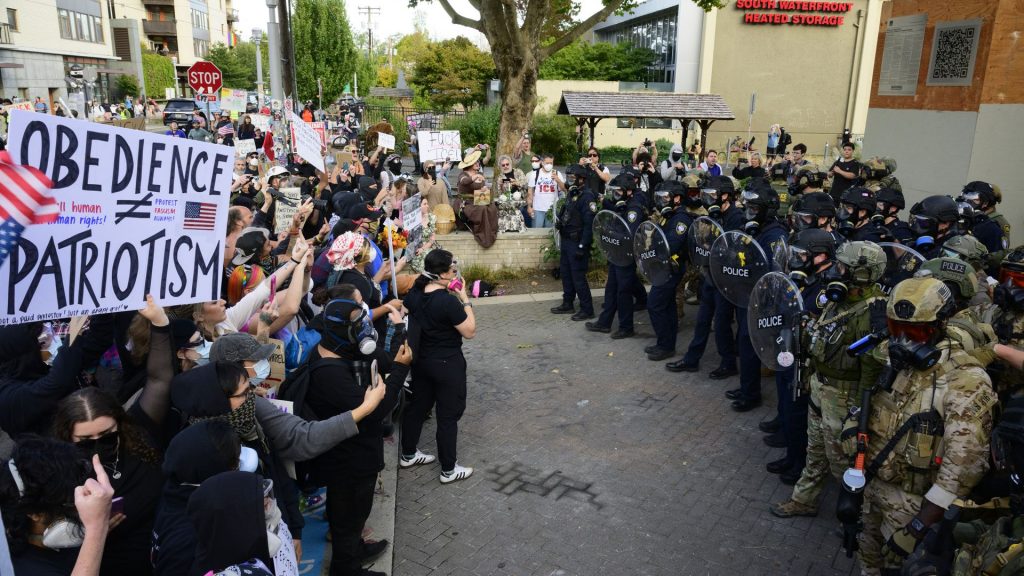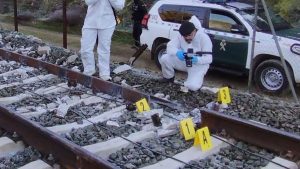Arrests decline in Portland ICE protests before Trump deployed troops

Protests outside an immigration facility in Portland, Oregon, have waned over the summer, but that’s not stopping President Donald Trump from deploying 200 federal troops to the city. While arrests at the facility drew attention in June, the pace of arrests — and the intensity of the protests — declined even before the military arrived.
On Saturday, Trump directed Defense Secretary Pete Hegseth to provide troops to help protect Immigration and Customs Enforcement facilities, acting at the request of Homeland Security Secretary Kristi Noem.
“ICE Facilities under siege from attack by Antifa, and other domestic terrorists,” the president wrote in a Truth Social post.
Trump said he had authorized troops to use “Full Force, if necessary.”
Oregon leaders pushed back with a lawsuit to stop the deployment of 200 troops for as much as 60 days.
On Saturday, Oregon Gov. Tina Kotek and Portland Mayor Keith Wilson, both Democrats, led a peaceful demonstration to show the city did not need federal intervention. City officials said White House rhetoric had heightened tensions.
“In my conversations with President Trump and Secretary Noem, I have been abundantly clear,” Kotek said. “Portland and the State of Oregon believe in the rule of law and can manage our own local public safety needs. There is no insurrection. There is no threat to national security. And there is no need for military troops.”
Arrests and legal consequences
The Department of Justice said six people were charged in June after a confrontation outside the South Portland ICE facility. Court records show demonstrators clashed with federal officers during several nights of gatherings, with reports of fireworks, rocks and other objects being thrown at the building and law enforcement.
The charges included misdemeanor assault of a federal officer, failing to obey lawful orders and creating a hazard on federal property. Officials said the incidents began when crowds blocked vehicle gates, preventing law enforcement vehicles from entering and exiting the site. In one case, a federal officer was temporarily blinded by a laser pointer.
Since June 13, federal prosecutors have charged 22 people in connection with protests at the ICE building, citing offenses that include assaulting officers, arson, possession of destructive devices and damaging government property.
So far, at least three have received six-month probated sentences after pleading guilty to misdemeanor charges for failing to follow lawful orders, according to federal prosecutors. Another five are expected to enter guilty pleas within the next month.
All those arrested, whether awaiting trial or serving probation, are prohibited by court order from approaching the ICE building and the surrounding blocks.
Over the weekend, police reported that a gathering outside the ICE building turned physical when opposing groups began assaulting one another. Two people were arrested on assault charges, officials said.
Violent crime on the decline
While protests and arrests have drawn attention to Portland, midyear crime data show that the city’s overall violent crime rate has declined when compared to 2024.
Homicides fell from 35 to 17, a drop of more than 50%. Reported rapes decreased from 185 to 163, a decline of roughly 12%, and robberies fell from 525 to 491, about a 6% decrease. Aggravated assaults remained largely unchanged, with 1,442 incidents reported in 2025 compared with 1,452 in 2024.
The Portland Police Bureau said its officers do not assist federal agencies with immigration enforcement, including ICE, Customs and Border Protection or Homeland Security.
Officers are not permitted to arrest people for being in the country illegally or to question their immigration status.
The post Arrests decline in Portland ICE protests before Trump deployed troops appeared first on Straight Arrow News.





